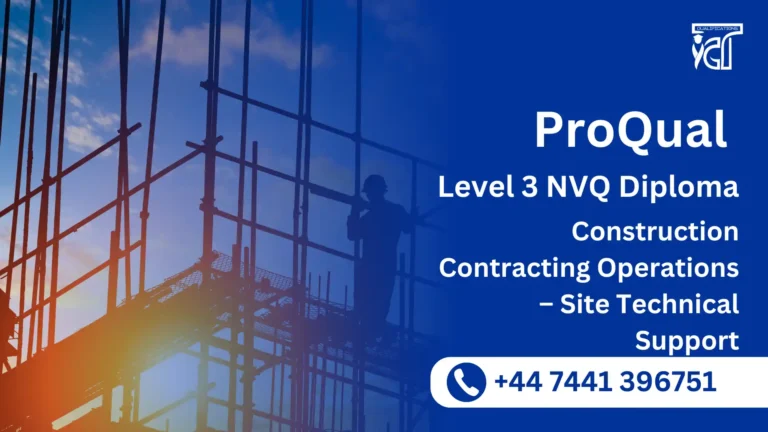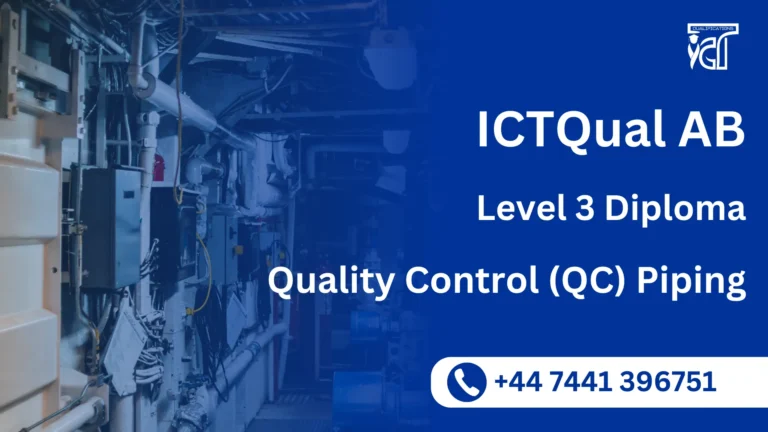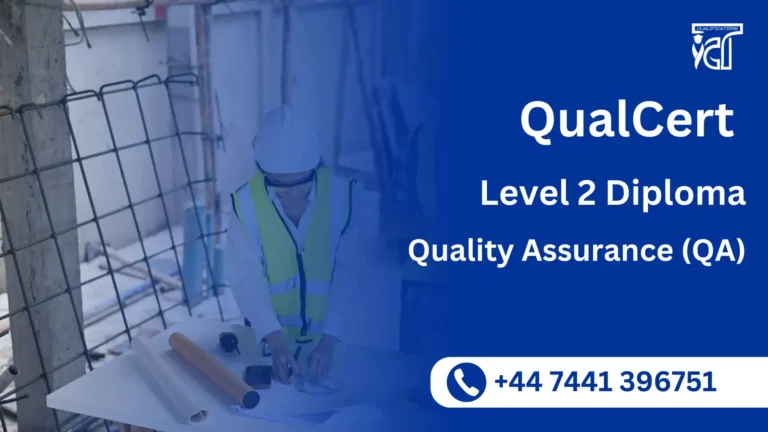The ProQual Level 7 Diploma in Quality Control & Quality Assurance (QA/QC) is a prestigious Ofqual‑regulated qualification designed to elevate your expertise in strategic quality leadership. Recognized as equivalent to a UK Master’s-level qualification, this advanced diploma provides an in-depth understanding of quality control systems, regulatory compliance, risk mitigation, and continuous improvement methodologies such as Lean Six Sigma and ISO 9001 standards.
Structured around ten comprehensive mandatory units, this course covers essential topics including Strategic Quality Management, Advanced Auditing Techniques, Statistical Methods for Quality Control, Supplier Quality Management, and Regulatory Compliance in QA/QC. Delivered through an assignment‑based portfolio instead of exams, it enables working professionals to demonstrate their competence through real-world workplace practice and led evidence creation .
This course is perfectly suited for seasoned professionals already working in quality roles—such as Quality Assurance Managers, Compliance Officers, Production Engineers, or Senior QA/QC Consultants—who want to take the next strategic step in their careers. Ideal across sectors like manufacturing, pharmaceuticals, construction, engineering, and service industries, it empowers leaders to implement robust quality systems, drive organizational excellence, and secure senior-level roles and chartered credentials
ProQual Level 7 Diploma in Quality Control & Quality Assurance (QA/QC)
The ProQual Level 7 Diploma in Quality Control & Quality Assurance (QA/QC), to achieve the qualification candidates must must complete the all mandatory units of Total Qualification Time (TQT): 1200 Hours, Guided Learning Hours (GLH): 600 Hours and 120 credits:
| Sr# | Unit Title | credit | TQT | GLH |
|---|---|---|---|---|
| 1 | Strategic Quality Management | 12 | 120 | 60 |
| 2 | Advanced Quality Auditing and Inspection Techniques | 12 | 120 | 60 |
| 3 | Statistical Methods for Quality Control | 12 | 120 | 60 |
| 4 | Quality Assurance in Manufacturing and Service Industries | 12 | 120 | 60 |
| 5 | Risk Management and Mitigation in QA/QC | 12 | 120 | 60 |
| 6 | Lean Six Sigma and Process Optimisation | 1`2 | 120 | 60 |
| 7 | Advanced Quality Management Systems (QMS) | 12 | 120 | 60 |
| 8 | Supplier Quality Management and Control Strategic Quality Management | 12 | 120 | 60 |
| 9 | Regulatory Compliance and Standards in QA/QC | 12 | 120 | 60 |
| 10 | Research and Development in Quality Control | 7 | 120 | 60 |
GLH (Guided Learning Hours) and TQT (Total Qualification Time) are terms commonly used in vocational qualifications to help define the amount of time a learner is expected to spend on their studies.
1. GLH (Guided Learning Hours)
GLH refers to the number of hours a learner spends being directly taught, supervised, or supported during their course. This includes the time spent in activities such as:
- Classroom instruction
- Practical workshops
- One-on-one tutoring or mentoring sessions
- Online learning sessions with tutor support
In other words, GLH represents the time that learners are actively engaged with their instructors or learning activities.
2. TQT (Total Qualification Time)
TQT represents the total amount of time a learner is expected to invest in completing a qualification, including:
- GLH (Guided Learning Hours): Time spent on direct learning, as explained above.
- Self-Directed Learning: This includes time spent on independent study, research, assignment completion, preparation for exams, and any other work the learner does outside of direct teaching hours.
TQT is a broader measure that includes all the time required to achieve the qualification. It helps learners and employers understand the overall commitment required for the qualification.
Key Differences Between GLH and TQT:
- GLH focuses on direct learning with guidance or supervision.
- TQT includes GLH as well as independent study time and other learning-related activities.
Example:
If a qualification has a TQT of 600 hours and a GLH of 250 hours, it means the learner should spend 250 hours in direct learning (classroom, online, or tutor-led sessions) and 350 hours on independent study or research.
ProQual Level 7 Diploma in Quality Control & Quality Assurance (QA/QC)
Strategic Quality Management
- Demonstrate a comprehensive understanding of strategic quality management principles
- Develop and implement a strategic quality management plan
- Analyse the role of leadership in driving quality management initiatives
- Assess the impact of external and internal factors on quality strategy
- Evaluate continuous improvement processes within strategic quality management
Advanced Quality Auditing and Inspection Techniques
- Demonstrate advanced knowledge of auditing and inspection processes
- Analyse inspection techniques used to assess product quality
- Apply advanced auditing techniques to evaluate quality systems
- Evaluate the effectiveness of quality auditing and inspection systems
- Communicate audit and inspection results effectively
Statistical Methods for Quality Control
- Understand advanced statistical methods in quality control
- Evaluate the application of statistical quality control methods in various industries.
- Apply statistical methods to monitor and control quality in processes.
- Interpret statistical data to improve quality control processes
- Use software tools to perform statistical analysis for quality control.
Quality Assurance in Manufacturing and Service Industries
- Understand quality assurance principles in manufacturing and service industries
- Address challenges in implementing QA systems
- Apply QA methodologies in manufacturing and service settings
- Evaluate the impact of QA on organisational performance
- Integrate continuous improvement into QA systems
Risk Management and Mitigation in QA/QC
- Identify risks associated with quality control and assurance processes.
- Evaluate risk management strategies in QA/QC
- Develop risk mitigation plans for QA/QC processes
- Monitor and evaluate risk management processes in QA/QC.
- Communicate risk assessments and mitigation strategies effectively.
Lean Six Sigma and Process Optimisation
- Understand Lean Six Sigma principles and their application.
- Apply Lean Six Sigma methodologies to optimise quality processes.
- Evaluate the effectiveness of Lean Six Sigma in quality improvement.
- Integrate Lean Six Sigma techniques into organisational culture
Advanced Quality Management Systems (QMS)
- Understand the key principles and components of an advanced Quality Management System (QMS).
- Design and implement an advanced QMS tailored to an organisation’s needs
- Evaluate the effectiveness and efficiency of a QMS.
- Apply advanced problem-solving techniques to enhance QMS.
- Integrate QMS into organisational culture.
Supplier Quality Management and Control
- Understand the principles of supplier quality management and control.
- Develop effective supplier quality management strategies
- Evaluate supplier performance.
- Manage risks associated with supplier quality.
- Utilise technology and software tools in supplier quality management
Regulatory Compliance and Standards in QA/QC
- Understand the importance of regulatory compliance in quality assurance and control.
- Analyse the impact of non-compliance on organisational operations.
- Apply regulatory standards in the development and implementation of QA/QC processes.
- Monitor and audit regulatory compliance
- Stay up to date with changes in regulations and industry standards
Research and Development in Quality Control
- Understand the role of research and development (R&D) in quality control.
- Conduct research to enhance quality control processes.
- Apply research findings to solve real-world quality control problems.
- Communicate research findings to stakeholders
Benefits of the ProQual Level 7 Diploma in Quality Control & Quality Assurance (QA/QC):
1. Master’s-Level, Ofqual-Regulated Qualification
This diploma is officially regulated by Ofqual (UK) and recognized internationally. It is equivalent to a Level 7 (Master’s) qualification, giving you a competitive edge in senior QA/QC roles across diverse industries.
2. Strategic Leadership in Quality Systems
You’ll gain in-depth knowledge of strategic quality planning, advanced auditing, and risk-based decision-making. The course enables you to lead large-scale quality initiatives and build systems that drive measurable improvement and compliance.
3. No Exams – Practical, Assignment-Based Assessment
The qualification is assessed through real-world projects and workplace portfolios—not exams. This flexible approach allows you to demonstrate competence in your current role while learning at your own pace.
4. Unlock Senior-Level Job Roles and Promotions
Earning this diploma qualifies you for high-ranking roles such as:
- QA/QC Manager
- Head of Quality Assurance
- Regulatory Compliance Director
- Senior Quality Consultant
- Operations or Production Manager (with QA oversight)
These positions come with higher salaries and greater leadership responsibilities.
5. Aligned with Global Quality Standards
You’ll gain hands-on expertise with internationally recognized standards such as ISO 9001, Lean Six Sigma, GMP, and total quality management (TQM), making your skills highly transferable worldwide.
6. Boost Professional Recognition and Credibility
This qualification supports professional memberships and chartership applications, such as Chartered Quality Professional (CQP) through the Chartered Quality Institute (CQI) or equivalent global bodies.
7. Applicable Across All Major Sectors
Whether you work in manufacturing, construction, pharmaceuticals, engineering, oil and gas, healthcare, or food processing, this diploma enhances your ability to lead quality systems that meet industry-specific compliance and operational goals.
8. Ideal for Experienced Quality Professionals and Team Leads
Designed for professionals with an existing background in QA/QC, the course helps you transition from mid-level management to strategic leadership, enabling long-term career growth and specialization.
The ProQual Level 7 Diploma in Quality Control & Quality Assurance (QA/QC) is specifically designed for experienced professionals who are looking to deepen their expertise in quality management, take on leadership roles, and drive strategic initiatives in quality control and assurance. This course is ideal for individuals who want to advance their careers and gain a deeper understanding of QA/QC practices at a senior level. Here’s who this course is best suited for:
- Quality Assurance Managers and QA/QC Leads
- Compliance Officers and Quality Control Supervisors
- Senior Engineers and Production Managers with QA responsibilities
- Regulatory and Risk Management Specialists
- Auditors and Internal Quality Reviewers
- Technical Managers overseeing manufacturing, construction, or pharmaceutical processes
- Professionals looking to formalize their practical experience with a globally recognized qualification
- Consultants and contractors aiming to expand their expertise in ISO, GMP, and TQM frameworks
It’s also ideal for those who want to work toward professional chartership, such as Chartered Quality Professional (CQP) status, or secure senior quality leadership roles in highly regulated industries.
If you’re leading quality systems, managing audits, handling regulatory compliance, or improving performance metrics within your organization, this course will strengthen your credibility, enhance your knowledge, and prepare you for high-level QA/QC responsibilities.
Completing the ProQual Level 7 Diploma in Quality Control & Quality Assurance is a major step toward senior leadership, global recognition, and long-term career growth in quality management. This Master’s-level qualification not only validates your current expertise but also unlocks new academic and professional pathways across multiple sectors.
1. Advance to Executive and Director-Level Roles
After completing this diploma, you’ll be well-positioned for high-ranking positions such as:
- Head of Quality Assurance
- Director of Compliance and Risk
- Senior QA/QC Consultant
- Global Quality Manager
- Quality Systems Leader
These roles offer greater influence, increased earning potential, and broader responsibility across departments or regions.
2. Pursue Chartered Quality Professional (CQP) Status
The Level 7 diploma supports your application for Chartered Membership with the Chartered Quality Institute (CQI). CQP status enhances your professional credibility and opens doors to global opportunities in regulated industries.
3. Progress to MBA or Postgraduate Degrees
This qualification is equivalent to a UK Master’s level and can serve as a strong foundation for progression into an MBA, MSc in Quality Management, or other Level 8 postgraduate diplomas especially if you’re aiming for senior leadership or academic recognition.
4. Transition into Quality Consultancy or Auditing
Many graduates use their Level 7 status to become independent consultants, lead internal or external audits, or offer compliance and process improvement services to global clients under ISO, GMP, or sector-specific frameworks.
5. Expand into Specialized Certifications
You may also choose to specialize further with certifications in areas like:
- Lean Six Sigma Black Belt
- ISO 9001 Lead Auditor
- Regulatory Affairs
- Pharmaceutical GMP Compliance
- Environmental and Occupational Health Quality Standards
6. Work Globally in High-Demand Sectors
The diploma is internationally respected, helping you qualify for QA/QC roles in global industries such as oil and gas, pharmaceuticals, aerospace, healthcare, automotive, and manufacturing—especially in the UK, Middle East, Asia, and Europe.
7. Strengthen Your Leadership Pipeline
This course enhances your ability to take part in corporate succession planning, quality strategy development, and interdisciplinary project leadership, making you an ideal candidate for senior executive training programs.
Entry Requirements
Register Now
Qualification Process
Qualification Process for the ProQual Level 7 Diploma in Quality Control & Quality Assurance (QA/QC)
- Self-Assessment:
Begin by evaluating your eligibility to ensure you meet the qualification requirements, including work experience, knowledge, and language proficiency. - Registration:
Complete your registration by submitting the required documents, including a scanned copy of a valid ID, and paying the registration fee. - Induction:
An assessor will conduct an induction to confirm your eligibility for the course and explain the evidence requirements. If you do not meet the criteria, your registration will be canceled, and the fee will be refunded. - Assignmnets & Evidence Submission:
Provide all assignmnets and the necessary evidence based on the assessment criteria outlined in the course. If you are unsure of the required evidence, consult with the assessor for guidance on the type and nature of evidence needed. - Feedback and Revision:
The assessor will review your submitted evidence and provide feedback. Evidence that meets the criteria will be marked as “Criteria Met,” while any gaps will be identified. You will be asked to revise and resubmit if needed. - Competence Evidence:
Submit final evidence demonstrating that all learning outcomes have been met. This evidence will be marked as “Criteria Met” by the assessor once it is satisfactory. - Internal Quality Assurance (IQA):
The Internal Quality Assurance Verifier (IQA) will review your evidence to ensure consistency, quality, and compliance with standards. - External Verification:
The IQA will submit your portfolio to ProQual’s External Quality Assurance Verifiers (EQA) for final confirmation. The EQA may contact you directly to verify the authenticity of your evidence. - Certification:
Upon successful completion of all checks, ProQual will issue your official certificate, confirming that you have attained the ProQual Level 7 Diploma in Quality Control & Quality Assurance (QA/QC)
FAQs for ProQual Level 7 Diploma in Quality Control & Quality Assurance (QA/QC)







